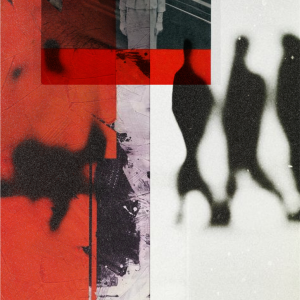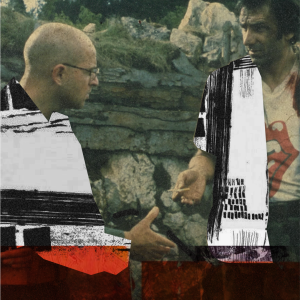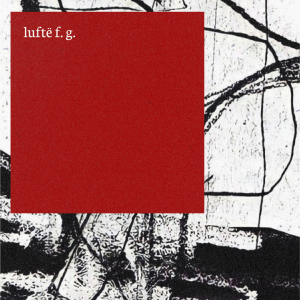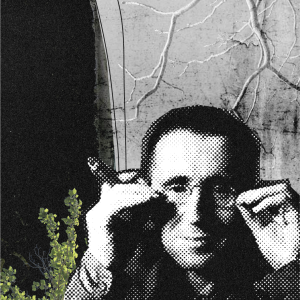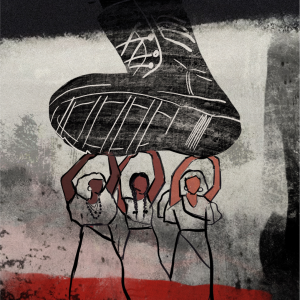Can we talk about women’s bodies as a battlefield of Bosnian war, without treating their bodies as a new battlefield?
“No Teeth…? A Mustache…? Smell like S**t…? Bosnian Girl.”
Graffiti written by an unknown UNPROFOR Dutch soldier on a wall of the army barracks in Potocari, Srebrenica, 1994/95. Bosnian artist Šejla Kamerić placed this quote on her self-portrait and used it as a representation treatment of Bosnian women during the war by the International community, as well as by the Serbian army.
This article explores the ways and impacts of how Bosnian women’s bodies are being used, presented, and investigated in the context of the 1992-1995 Bosnian War specifically presenting gender-based violence portrayal in academic texts/literature, and to some extent accompanied by media and culture for contextualization. I use the term Bosnian women, which refers to the nationality, and not the ethnic division (Bosnian-Serb, Bosnian-Croat, Boshnjak-Muslim), even though most of the scholarship focuses on Bosnian-Muslim women. Later on, I will also elaborate on the implications of the erasure of gender-based violence (hereafter GBV) towards Bosnian-Serb and Bosnian-Croat women, to certain accounts.
In the context of gender-based violence, the concept of the body has been fairly researched and theorized. However, there are two sides to the coin when it comes to how this embodiment is presented in the academic narrative around Bosnian women’s bodies during the war. On one side of the coin, the academic contribution redefended how rape is conceptualized during conflict. On the other, the questionable process of conducting research, the embodiment of the trauma, and presumed hierarchy, create a continuation of the colonial narrative hidden in feminist contribution. As a conceptual framework of analysis, I will be using a poem created by a Bosnian author, Selma Asotić, “They Descend Upon Us”, which speaks directly about academic extractivism, abuse of war trauma, the survival positionality, and epistemological oppression as a result.
When writing and researching this piece, one question always remained open: What is the initial idea that serves as a starting point for certain feminist practices to be oriented towards Bosnia as a research field regarding GBV during the war? Conveniently enough because it is not too far from Western academics like the “Global South”, or is this just a continuation of the Orientalist narrative towards the Balkans in general?
“The American PhDs, eager to investigate this part of the world so often plagued by bursts of inter-ethnic violence. Before they arrived, we never knew murder was indigenous to our hands, a thing that blooms at regular intervals like the laughter of history.
Nick from Connecticut is here to inspect.
A peace studies graduate, whenever there’s war
Nick from Connecticut is deployed to spread common sense,
ask the right questions—why, instead of why not” …
Political and Cultural Context
Records show that around 50,000 Bosnian women were systemically raped during the Bosnian Wars. The violation of the women during war in BiH, has been documented, and some were prosecuted, but not fully treated in a manner where state responses and international laws were appropriately conveyed. The definition of abuse varies based on national law; for example, some laws require physical evidence and do not recognize emotional and psychological harm.
This creates limitations in the legal framework for the procession of these cases. Serbian, Croatian and Bosnian states post-war dealt with the survivors of rape during the war, which has been also constructed by patriarchal norms, similar to the way of using women’s bodies as a battlefield in war: rape, dehumanization, sexual enslavement; (Cohen, 1996). Trial’s Bosnia report (2018) shows that “Bosnian authorities constantly evoke the need to move on and forget the atrocities of war, but by adopting this attitude they neglect the rights and needs of many survivors”.
However, one aspect remains underrepresented. There is epistemic neglect, through the mechanism of the homogenisation of rape and GBV experiences in and by the Western-produced academia, creating narratives of helpless, silenced, dismembered women. This intervention is important because it was the refusal to be silent by the raped women during the war that served as one of the driving forces for the creation of the International War Tribunal (Žarkov, 2007).
It took their courage to speak publicly and openly during and after the war which brought more light into how GBV was defined in international law and prosecuted. Key findings show in the Western academic portrayal of the forced embodiment of silence and shame to the experience of the Bosnian women survivors.
The framing of that identity and misuse of their trauma as Žarkov, a Serbian researcher, notes it as a direct insult to the raped women from Bosnia (and Croatia) because many of them refused to be silent and ashamed. “They not only spoke out and demanded justice, but also worked for it, in the midst of war” (Žarkov, 2007).
Perception and Presentation of Bosnian Women by Media
“Please don’t let them kill us”
Kothe talks about the treatment of women’s bodies in evoking empathy and creating visibility of the war in mainstream media. She points out the irony that in order to summon effect in the West, presenting the complexity of representation of a city under siege, “calls for a translation into western hegemonic terms, like blond beauty queens… consumed as merely pretty (by western standards) “orientally” located women saved by our western crusaders from certain doom”(1999, p.151).
Specifically, this has a role from the established confusions which Western academics have when understanding the Muslim aspect of Bosnian women’s identity. Žarkov brings Tone Bringa’s (1995, p. 7) analysis to this account: pointing out “that Orientalism affects capacity of European ethnographers to deal with the Europeanness of Muslims in Bosnia, …, Bosnian Muslims were defined either as not really European, or as European but not really Muslim”.
The documentary Miss Sarajevo (Bill Carter) is about a beauty pageant held during besieged Sarajevo. Its description read: “The winner was a 17-year-old blonde named Inela Nogić.” Then, Miss Sarajevo as a song was created by the Irish rock band U2. The visual representation was Bosnian Miss pageants holding a sign: “Please don’t let them kill us”. For many Bosnians, those Western cultural interventions are considered of significant importance as calls for an end to violence. Pictures of Bono are hanging on the walls of many local shops, where once there was a photo of Tito. However, it is important to move beyond the good intentions of U2 and Bill Carter, as we live in a society of hegemonic discourses, which portray different women otherly.
“We give them a voice”
When we speak about ownership in the context of women’s bodies and voices, we should go beyond neoliberal, or private property discussions related to critics of colonial scholarship (Phillips, 2011; Davies, 1999). The concept of ownership here relies on ownership of narrative, a story told about someone’s trauma, abuse, and experiences. This analysis serves as another fuel in the process of reclaiming the positionality of the survivors.
“By giving a voice to women who have experienced such an ordeal and letting them position their experiences, we gain insight into the diverse impacts that war rapes have on different victims, their families and relationships.” (Skjelsbæk, 2006)
Positionality of Other Bodies
There is a notable, patronizing, savior complex narrative in academic writing by people who have not experienced the war or do not come from BiH. Regardless, it is worth noting that actually a lot of Western academics have also contributed to the visibility and recognition of war and the monstrosities which happened. Some of them even shared their negative personal implication due to hearing rape stories. The effect of the Bosnian war will continue to have an impact on all of us, especially if we take into consideration contemporary problems in the country.
Their trauma is political, it did not happen solely on nationalist propaganda – its explanation does not lie in a sophisticated academic explanation. Dissecting testimonies of women survivors might give feminist scholarship tools on how to understand trauma, but some things cannot be translated or contextualized so the average American can understand why the violence happened, and how it was the central role of GBV in erasing Bosnian identity and nationality.
Another aspect for further research that is outside the scope of this essay, though remains a valid critique: Is this work taking a political stand and making a change, or is it being for individual professional and academic development? The essential critique of this essay is not to individualize guilt, or villainize Western (feminist) scholars, but to call on challenging hierarchical positionings into the savoir complex which holds colonial history. Additionally, it questions how further objectification occurs when someone is academically investigating a specific form of gender violence. Using narrative “giving voice” comes with assumptions that the women they are referring to have no agency, that their bodies were voiceless before their arrival.
“How would you like to start?
From the beginning or only the most important details?
Do you want to hear about the attack on the village or only about the concentration camp?” (rape survivor, cited in Skjelsbæk, 2007 p. 382)
In Lugones’ uncompromising critique towards white feminism, with a call on decolonizing gender as a notion, I would like to add one more category of women whose voice has been tampered with by Bosnian women. As she notes, some white feminists presume sisterhood based on gender (Lugones, 2016, p. 13) completely erasing intersectional levels of inequalities by which some bodies are determined.
Portraying Bosnian women as in need of saving by Western academia, also serves as an attempt to erase historical stereotyping of Bosnian women, or women from Balkans as exotic, and oriental by the colonial West.
“There is a strong, albeit contested, current within feminism which holds that speaking for others—even for other women—is arrogant, vain, unethical, and politically illegitimate.” (Roof, 1995,p. 97) As Roof suggests, even though feminist scholarship has a liberatory perspective, which evolves speaking on behalf of other women (genders), blurring the lines on race, power, culture, and sexuality, and adding geographical positionality (Roof, p. 98), endangers the main idea of feminist work. In the case of Bosnia, ethnicity and religion play a crucial role in the mechanisms of portrayal. In her extensive research, Žarkov (2007), analyzes the multilayer approach of stereotypical epistemic injustice towards women of Bosnia.
Western academia decides what is included as appropriate analysis of how the Bosnian women survivors “can efficiently move past trauma”. Positioning of storytellers is important because they are the ones who hold epistemic authority, influence policy-making, international law and relations and to some extent define the future of reconciliation processes (role of the international community).
It is Western academic work which will be considered relevant, peer-reviewed, written with perfect academic style in high-level English, and serve as an argument when making peace recommendations for the reconciliation process.
The feminist notion of Rich reminds us that specific subjection of women needs to be addressed. However, addressing comes with speaking and refusing conversation to be led by someone else, revoking silence and demanding justice (Rich, 1984, p.214). Rich elaborates on different concepts in relation to whiteness, but for the specifics of this essay, I will quote Rich: “the faceless, raceless, classless category of “all women”, as a category created of white western self-centerless.”
The importance of this context speaks about the intersectional approach on a transnational level. To say that issues are “faceless” and “classless” ignores citizenship, geo-political location, and fragile societies. From a political perspective, if we take into account that currently in 2022, Bosnian activists, academics and media, warn that there is a possibility of new destabilization (Insight, 2022).
Researchers have established a link between violated female bodies and the voicelessness of the women victims in Argentina and Bosnia respectively, asserting that the muteness of the female victim went hand in hand with appropriation of her pain and her voice for political purposes (dictatorship, nationalism). (Taylor, 1993; Kašić, 2000). Drawing attention to potential political agency which might be jeopardized due to reproducing the image of Bosnian women as powerless, when faced with new challenges due to old unresolved justice processes.
Particularly in this war, one of the general takeaways was the failure of the international community to react timely and accordingly, which unfortunately serves as another reminder of the treatment of ongoing conflicts.
The burden falls on Non-western academics to recover the damage done by the epistemic oppression
In her analytical book, Žarkov notes that even in feminist research, imagery of silenced and ashamed Muslim women is reproduced. She specifically highlights Western Academic authors and experts in that account Caroline Krass (1994), Elizabeth Kohn (1994), and Jordan (1995) among others. This academic intervention highlights the forced embodiment of silence instead of the already active embodiment of resistance by Bosnian women. Therefore, it is important to note that these academic writings are in no way harmless.
Bosnian Community
In Bosnia, one main aspect for rehabilitation and resocialization of raped women was the community around them, and women’s organizations and not always institutions. Therefore, in the Bosnian context, the depiction of the Muslim community as not accepting of GBV survivors deepens Western stereotyping. There are many reports which indicate that survivors were supported by their families (Mertus, 2004; Isaac & Jurasz, 2018).
Additionally, the collective response to the trauma created targeted organizations led by Bosnian women. Without even responding to the epistemic authority of colonial feminist academia, women’s organization in BiH continue their efforts to address the ruins of the war in lack of systemic support. Such as Snaga Žene and Sara-Srebrenica, focusing on assistance to women and rebuilding communities (Rodriguez, 2021).
The Role of Muslim Identity
Researchers continue to rely on their biases, merging the identity of a victim and the religious identity into an exclusive embodiment of Muslim women. They are regularly represented as blind followers or victims of traditional norms and thus denied any personal autonomy or political subjectivity of their own (Bloul 1997, Lutz 1991, 1997) as cited in Žarkov, 2007). To support these claims, here traditionally gendered aspect of portray of Bosnian women’s bodies in Western academia takes place:
“Their bodies have been part of the battlefield, but their female identities have not been destroyed. They are still mothers of their children, wives to their husbands and caretakers within their families.” (Skjelsbæk, 2006, p.387 )
The implication that rape can destroy feminity, and motherhood, adds predetermining baggage on already established domination of gender relation to sexual violence and nation. It constitutes that body defines a survivor’s ability to be something else than a victim “forever”. “These definitions, paradoxically, reinforce the greatest of all gender distinctions, assuming, once again, the omnipotence of men and the absolute powerlessness of women.” (Žarkov, 2007, p. 177) In combination with practices of silencing and erasing agency, different studies point out another relevance: the relation to community.
Further Impact on Feminist Fights
Two specific accounts can be distinguished when analyzing the case of the American feminist Catharine MacKinnon: denial of rape of Bosnian-Serb women and exploitation of the rape in Bosnian Muslims, as a tool for anti-porn advocacy on her behalf. In Žarkov’s analysis, it shows that MacKinnon is one of the most quoted essays (at that time) regarding GBV in Bosnia, due to her international status, regardless of her positions being rightfully questioned. That article contributed to spreading the victimization of Muslim women and demonization of Serbs and rendering raped Serb women invisible (Stiglmayer, 1994).
Their PhDs are submitted, but where is the change?
Even though most of my analysis is based on Žarkov’s work, I would like to draw on my interpretations. Regardless, of the distinguished scope of work done as a form of critique, there is a need for more improvement regarding creating colonial, disempowering, white, western feminist values in research practice and the production of knowledge. In my limited research, as a form of accompanying already existing critique, I noted several mechanisms of use, in reviewing academic articles (Koenig, 1994; Skjelsbæk, 2006; Helms, 2008) with keywords: GBV, rape, Bosnia. Analysis: most of their reliance on additional literature by Western academia is on more Western academic writings about BiH, GBV and related trauma. There is a certain location as their starting point: of need for research in this specific field, usage of narrative analysis, direct mentioning of bodily harm, explicit words of pain, a presumption of silence and shame as an effect in survivors’ processing of trauma. A further recommendation needs to be stated: “Instead of feeding our reality with more muted and dismembered female bodies, dressed in shame and silences, feminist representation itself has to deobjectify the female body and invite, if not force, others, to do the same”. (Žarkov, p.177)
In the end, I would like to note one important aspect: If I were not a student on a scholarship at LSE, I would not have access to most academic articles written about BiH, War and all of the analyses on GBV. Regarding my contribution to the scholarship, I was thinking what is the right language in which I should speak about something personal as someone with Bosnian heritage.
Should I accommodate the already existing grammar structure by a Western feminist who was “first” to engage with analysis of GBV in Bosnia, or should I challenge epistemic hegemony, using wind in my back by decolonial and Bosnian/Balkan feminists? Academic language is inherently inaccessible to people affected by war, rape and structural inequality.
Bosnian scholars were too busy living the implications of war and working in the field to support the survivors, but now there is a lot of scholarship done by their side, calling on transnational solidarity in different contexts. Hopefully, by attacking the idea of hierarchies in (re)production of knowledge we can move forward to a world, where a perfect English accent is not a prerequisite to being valued.
“In the acknowledgements, you’ll express sincere gratitude to survivors whose stories testify to the need for restorative justice and transversal reconciliation in the subliminal space of post-conflict contexts.
After you, we lie wide-eyed for a long time,
trying to remember our names.
Drool trickles down our chins.
Because we’re imagining tying you to a chair,
bashing in your head, sweet, baby boy from Connecticut.”
__________________________
©
Disclaimer: “This publication has been produced with the support of Heinrich Böll Stiftung, Tirana Office. Its contents are the sole responsibility of the author and “Shota” magazine and do not necessarily reflect the views of the donor.”

